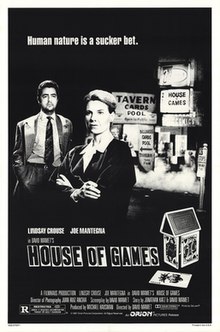
David Mamet and Motion Pictures
by Alex Carnevale
The scariest film I have ever seen, besides Jeeper Creepers 2 which was on local TV the other night, is The Spanish Prisoner. It is a comedy of menace. Like most of the American playwright David Mamet's humor it is subtle and rich.

Mamet's film career (we'll tackle his stage efforts next time) began when he worked on the Paul Newman vehicle The Verdict. This tender tale of alcoholism is one of the best films of the 1980s and features Mamet's first controversy, over the film's double ending.

current wife Rebecca Pidgeon
The Spanish Prisoner is Mamet's fifth film. It has perfect casting, an innocent mood, and a pretty girl - Mamet's second wife, Rebecca Pidgeon. It concerns itself with a chance meeting on vacation, after which it dreamily moves back to the States. Campbell Scott portrays the inventor of the process, an entertaining MacGuffin that pokes fun at Mamet's own Pulitzer-winning masterpiece, Glengarry Glen Ross.

his adaptation of terrence rattigan's the winslow boy
Mamet breathed life into the Father of the Bride by casting him as the powerful and knowing Jimmy Dell. An outing at the club is the film's most brilliant sequence, replete with the epic heights of Mamet's anti-Stanislavski take on acting, relentlessly perfected by acolytes William H. Macy and Joe Mantegna.

Mamet cast his wife in his debut film about con artists, House of Games. It was actually too much like a stage play, but one of the great stage plays ever written - that's what he was working with here.
Even though he was eventually to beat the subject matter into a pulp in his Shell Silverstein collaboration, Things Change and the overdone 'thriller' Heist, its first appearance was its best edition. The film's style and tone resembles Hitchcock, parodying the boxed in feel of Vertigo, or the passing danger of Strangers on the Train.

Before creating a TV series inThe Unit, Mamet proved he could write everything, taking a dead script for the 1999 De Niro thriller Ronin and turning it into a vastly entertaining parable about thieves. His lighter takes on life; the lovingly provincial State and Main, the gimmicky Wag the Dog, both of which are underappreciated classics, were important to the catalog, if only because they weren't so full of hate.

Mamet's sexist view of art (he famously shut down an all female production of Glengarry Glen Ross) is on display in his bare bones adaptation of Oleanna that he subjected American audiences to in 1994. The paradigmatic perfect stage play that would never work on the big screen because it is so predicated on the shared reaction of its audience, its failure motivated Mamet to return to the stage, albeit not before telling working directors how good he was at his favorite hobby in On Directing Film.

Mamet's view of acting is for his actors to simply say the lines, instead of bringing any context or motivation to the role. This is indirectly the subject of the famous speech Dave wrote for De Niro in The Untouchables.

The mad satirical desperation of a script even its director Lee Tamahori didn't understand in The Edge had men confronting nature for the answer. But in the end, Mamet finds the most entertainment in human troubles and human conflict. The movie itself is another great play, with mindblowingly existential dialogue, done tongue in cheek, that both amuses itself and advances the drama.

Mamet's films range in quality of film, but not of script. His directorial debut starring then-wife Lindsay Crouse as a psychologist is so ahead of its time it's tough to imagine it wasn't written today. The Spanish Prisoner still falls in my hard top ten of the greatest things ever done in film. In those moments you feel him consciously leaving the stage to investigate other locales. This is an urge that lets Mamet opine about Israel, pen a book of poetry and several novels, and generally behave as he does.
Yet there is always a coming together, a talking to.

Alex Carnevale is the editor of This Recording. He lives in Manhattan, and he tumbls here.

"The Disease" - !!! (mp3)
"Heart (radio edit)" - Stars (mp3)
"The Funky Branca" - !!! (mp3)

PREVIOUSLY ON THIS RECORDING
Attack of the gingers.
Death of a populace
Probably the best photoset of a whore ever

